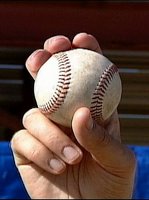Curveball : More evidence of the misuse of evidence
 BERLIN -- The German intelligence officials responsible for one of the most important informants on Saddam Hussein's suspected weapons of mass destruction say that the Bush Aadministration and the CIA repeatedly exaggerated his claims before the Iraq war.
BERLIN -- The German intelligence officials responsible for one of the most important informants on Saddam Hussein's suspected weapons of mass destruction say that the Bush Aadministration and the CIA repeatedly exaggerated his claims before the Iraq war.Five senior officials from Germany's Federal Intelligence Service, or BND, said in interviews with the Los Angeles Times that they warned U.S. intelligence authorities that the source, an Iraqi defector code-named Curveball, never claimed to produce germ weapons and never saw anyone else do so.
According to the Germans, President Bush mischaracterized Curveball's information when he warned before the war that Iraq had at least seven mobile factories brewing biological poisons. Then-Secretary of State Colin L. Powell also misstated Curveball's claims in his pre-war presentation to the United Nations on Feb. 5, 2003, the Germans said.
Curveball's German handlers for the last six years said his information was often vague, mostly second-hand and impossible to confirm.
"This was not substantial evidence," said a senior German intelligence official. "We made clear we could not verify the things he said."
The German authorities, speaking about the case for the first time, also said that their informant suffered from emotional and mental problems. "He is not a stable, psychologically stable guy," said a BND official who supervised the case. "He is not a completely normal person," agreed a BND analyst.
Curveball was the chief source of inaccurate pre-war U.S. claims that Baghdad had a biological weapons arsenal, a commission appointed by President Bush reported earlier this year. U.S. investigators did not interview Curveball, who still insists his story was true, or the German officials who handle his case.
The German account emerges as Washington is engaged in a political battle over pre-war intelligence. The White House lashed out last week at Senate Democrats and other critics who allege the administration manipulated intelligence to go to war. Democrats have forced the Senate intelligence committee to resume a long-stalled inquiry. Democrats in the House are calling for a similar inquiry.
An investigation by the Times based on interviews since May with about 30 current and former intelligence officials in the U.S., Germany, England, Iraq and the United Nations shows that U.S. bungling in the Curveball case was far worse than official reports have disclosed.
The White House, for example, ignored evidence that United Nations weapons inspectors disproved virtually all of Curveball's accounts before the war. President Bush and his aides issued increasingly dire warnings about Iraq's germ weapons as the invasion neared, even though intelligence from Curveball had not changed.
At the Central Intelligence Agency, senior officials embraced Curveball's claims even though they could not verify them or interview him until a year after the invasion. They ignored multiple warnings about his reliability, punished in-house critics who provided proof that he had lied and refused to admit error until May 2004, 14 months after invasion.
After the CIA vouched for Curveball's information, President Bush warned in his State of the Union Speech in January 2003 that Iraq had "mobile biological weapons labs" designed to produce "germ warfare agents." The next month, Bush said in a radio address and a statement that Iraq "has at least seven mobile factories" for germ warfare.
Curveball told his German handlers, however, that he had assembled equipment on only one truck and had heard second-hand about other sites. Moreover, he could not identify what the equipment was designed to produce.
"His information to us was very vague," said the senior German intelligence official. "He could not say if these things functioned, if they worked."
David Kay, who headed the CIA's post-invasion search for illicit weapons, said Curveball's accounts were maddeningly murky. "He was not in charge of trucks or production," Kay said. "He had nothing to do with actual production of biological agent. He never saw them actually produce agent."
Powell also highlighted Curveball's "eyewitness" account when he warned the U.N. Security Council on the eve of war that Iraq's trucks could brew enough weapons-grade microbes "in a single month to kill thousands upon thousands of people."
The BND supervisor said he was aghast when he watched Powell misstate Curveball's information as a justification for war.
"We were shocked," the German official said. "Mein Gott! We had always told them it was not proven. … It was not hard intelligence."
In a telephone interview, Powell said CIA director George J. Tenet and his top deputies personally assured him before the Feb. 5, 2003, speech that intelligence on the mobile labs was "solid." Since then, Powell said, the case "has totally blown up in our faces."
Powell said no one warned him that veterans in the CIA's clandestine division, including the European division chief, had voiced growing doubts to supervisors about Curveball's credibility.
continue reading the article Here


3 Comments:
H, just thought you may want it:
http://www.jpost.com/servlet/Satellite?cid=1132475588009&pagename=JPost%2FJPArticle%2FShowFull
Zarqawi is dead.... again! US says no, but another mid-east site claims his death....
hehehe G , thanks , i spotted it just havent posted on it yet ,
I have posted a few interesting links on the discussion on dissent
yup , wise words hype , and there is nothing i could (or should) add to the truth
Post a Comment
<< Home